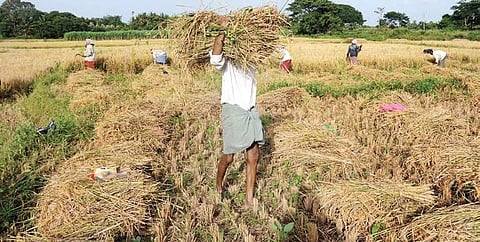

BENGALURU: Taking pride in being the ‘Mannina Maga’, H D Kumaraswamy’s maiden budget has brought cheer for many small and marginal farmers reeling under the burden of farm loans. But more was expected from the government — in at least making a beginning towards formulating an integrated approach to address the distress in the farming sector.
The waiver announced on Thursday comes with 15 pre-conditions, denying the benefit to thousands of farmers. The budget has disappointed those who had expected a blanket waiver.
“The CM has betrayed the farmers. The partial farm loan waiver is just a temporary relief. but there is not a single initiative with a long-term vision,” Badagalapura Nagendra, General Secretary of Karnataka Rajya Raitha Sangha told TNIE.
About 79 lakh families in the state are dependent on the farm sector and the budget was expected to come out with a slew of proposals to raise their income, promote small agri-based industries and welfare programmes for children of farmers. “Farmers had demanded a comprehensive package for rejuvenation of the sector, implementation of Swaminathan Committee report, development of native varieties of seeds, incentives for chemical-free agriculture among others. We are disappointed,” Nagendra said.
The allied sectors like animal husbandry, vermicomposting, innovative programmes to encourage rural youth to set up small agriculture-related enterprises could have been drafted into the budget, feels economist and visiting professor at Institute of Social and Economic Change, Prof Abdul Aziz.
With the Narendra Modi government announcing a hike in MSP just a day earlier, expectations from the state government were high. “But there is no plan to address the perennial problem of crash in prices of agriculture commodities. Programmes like investment subsidy for rural youth to set up micro industries related to agriculture in their localities may have helped prevent large-scale migration to cities,” Nagendra suggested.